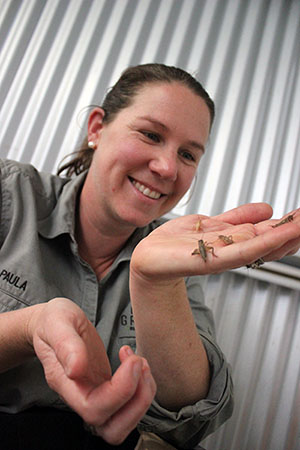MEDIA RELEASE Thursday, July 18, 2024
Australians could eat more insects, and they could provide a sustainable, nutritious food source, if a path can be found through significant commercialisation challenges.
This is the focus of a Nuffield Australia report released today, penned by scholar Paula-Lee Pownall, a pioneer in Australia's edible insect industry.
The report highlights the economic and regulatory hurdles that prevent insect protein becoming a mainstream, sustainable and nutritious food source.
Paula, from West Coolup, Western Australia, identified several factors contributing to the industry's limitations, including high production costs, regulatory challenges, and consumer hesitation.
"While insects offer remarkable sustainability benefits and nutritional value, the current market conditions in Australia make it difficult to establish a commercially viable insect-based food industry," Paula said.
Paula founded WA's first edible insect farm, which processed and manufactured high-protein insects, most notably domestic house crickets and mealworms, for human food and animal supplements. They paused producing insects in 2023, while Paula researched whether the industry was commercially viable, to help her decide whether they should continue.
Paula's research identifies several key factors contributing to the industry's limitations, including high production costs, regulatory challenges and consumer hesitation.
Despite all these obstacles, her report emphasises the long-term potential of insect-based foods in addressing global food security and sustainability concerns.
Her research, conducted throughout her travels to Singapore, India, Qatar, Germany, the Netherlands, USA, Canada and Australia, involved extensive analysis of global food insect farming practices and market trends.
"Insects are high in protein with 69 grams of protein per 100 grams, and rich in B vitamins including B12. You can use 100 per cent of the insects. Insects use less land, water and other resources to grow compared to traditional animal proteins.
"However, we need to overcome significant economic and cultural barriers to make this a viable option for Australian consumers and producers."
Paula said many businesses she met with identified cricket production systems needed to increase automation and technology, reduce costs, increase supply and consistency, and develop consistent markets.
"While there are opportunities for cricket protein as a sustainable source of nutrition, the industry needs to work closely with government and key stakeholders to not only identify markets, but also develop and build markets for crickets as an alternative protein source to become economically viable."
The report explores innovative approaches being implemented in other countries to promote insect consumption and suggests potential strategies for overcoming challenges in the Australian market. These include targeted consumer education, marketing campaigns that tell great stories and tap into consumers' values, streamlined regulatory processes, and investment in research and development to reduce production costs.
"With the right support and innovation, insect-based foods could play a crucial role in Australia's future food systems."
In the shorter term, Paula is interested in exploring options for insects to be included in skincare and pharmaceuticals. While she is no longer producing crickets, Paula happily consults to businesses that do.
She encourages people who work in food production to consider doing a Nuffield Scholarship. Her research gave her comfort that now is not the right time for her to produce insects for food, and she learned a great deal about herself and forged connections that will last a lifetime.
Paula's research was sponsored by Nuffield Australia's West Australian Alumni, supported by the Peel Development Commission.
For more on Paula's research findings, see her presentation from last year's Nuffield National Conference here.
Other Nuffield scholars will present their research findings at the 2024 National Conference in Launceston, Tasmania from 2-4 September.







